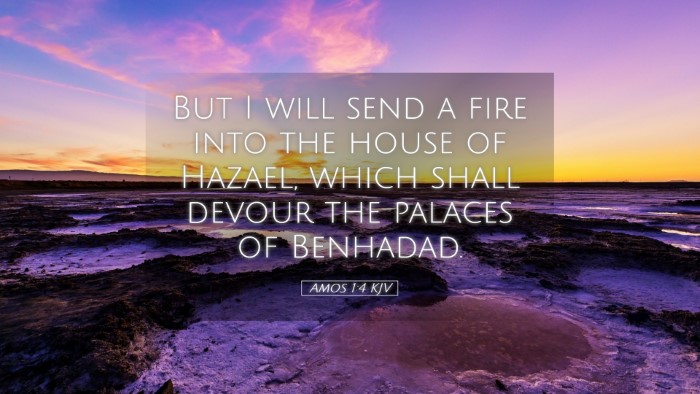Old Testament
Genesis Exodus Leviticus Numbers Deuteronomy Joshua Judges Ruth 1 Samuel 2 Samuel 1 Kings 2 Kings 1 Chronicles 2 Chronicles Ezra Nehemiah Esther Job Psalms Proverbs Ecclesiastes Song of Solomon Isaiah Jeremiah Lamentations Ezekiel Daniel Hosea Joel Amos Obadiah Jonah Micah Nahum Habakkuk Zephaniah Haggai Zechariah MalachiAmos 1:4
Amos 1:4 KJV
But I will send a fire into the house of Hazael, which shall devour the palaces of Benhadad.
Amos 1:4 Bible Commentary
Amos 1:4 Commentary
Bible Verse: "But I will send a fire upon the house of Hazael, which shall devour the palaces of Benhadad." (Amos 1:4, KJV)
Introduction
The book of Amos, a seminal work in the prophetic literature of the Old Testament, opens with a series of oracles concerning the nations surrounding Israel. In Amos 1:4, the prophet Amos delivers a striking message of divine judgment directed specifically at Damascus, the capital of Syria. The focus here is on the impending devastation that will come upon the house of Hazael and the palaces of Benhadad.
Historical Context
To fully understand the import of Amos 1:4, one must consider the historical context. Hazael was a king of Syria who rose to power during a time of increasing conflict and territorial expansion. His reign was characterized by both military aggression and political maneuvering in the region. Benhadad, mentioned in this verse, refers to Hazael’s predecessor, encapsulating a historical lineage of conflict where the rulers of Syria faced acts of war as prophesied by Amos.
Thematic Analysis
This verse encapsulates several key themes that resonate throughout the Bible and particularly in prophetic literature:
- Divine Judgment: The proclamation of fire signifies complete destruction, a common biblical metaphor for God's judgment against nations that oppose His will.
- God's Sovereignty: The prophecy highlights God's authority over all nations, emphasizing that no power can stand against His decree.
- Retribution: The verse implies that the actions of Hazael and Benhadad have led to God's decision to enact revenge, a theme prevalent throughout scripture.
Commentary Insights
Matthew Henry's Commentary
Matthew Henry presents valuable insights into the significance of this passage, suggesting that the fire mentioned denotes a divine judgment that will incur swift and devastating consequences upon Hazael's house. He interprets the "fire" as a symbol of both wrath and purification, indicating that while desolation will occur, it is also a means by which God’s justice is displayed.
Albert Barnes' Notes
Albert Barnes elaborates on the historical setting, pointing out that Hazael’s cruelty and ambition evoked God’s judgment. He emphasizes that the prophecy is delivered with unambiguous finality, asserting that the impending fire will not merely harm but entirely consume the palaces of Benhadad. Barnes reflects on the inevitable defeat of human powers in the face of divine authority and encourages believers to see both the immediate and eschatological implications of such prophecies.
Adam Clarke's Commentary
Adam Clarke adds depth by noting that the mention of fire symbolizes not only destruction but also the trials that purify God’s chosen people. Clarke posits that the historic calamity upon Syria serves as a warning not only to the immediate spectators but also to the nations beyond Israel. His reflections invite readers to ponder the moral and ethical implications of societal conduct in relation to divine judgment.
Theological Reflection
The verse serves as a powerful reminder of the consequences of national sin. For modern readers, particularly pastors and theologians, Amos 1:4 is a clarion call to evaluate our own societies in the light of biblical values. It invites reflection on how we, as a collective people and as individuals, can align ourselves with God’s will to avoid the repercussions of His judgment.
Practical Application
The implications of Amos 1:4 extend far beyond historical narratives; they pose profound questions for spiritual leaders and congregations today:
- Awareness of National Morality: How does the morality of our nation align with God's expectations, and what might be the consequences of our current trajectory?
- Personal Responsibility: In what ways can individuals take a stand against injustice and immorality in their communities?
- Call to Repentance: Is there a need for a collective call to repentance, recognizing the grace offered through the Gospel even in the context of impending judgment?
Conclusion
Amos 1:4 is not just a historical account but an essential theological statement about God’s judgment and grace. It serves as a stark reminder that God is concerned not only with Israel but also with all nations. This divine oversight compels a deeper understanding of our role in today’s world as we seek to emulate the principles taught in scripture. Through insightful engagement with such passages, scholars, pastors, and students can draw on the richness of the biblical text and apply its teachings to our contemporary lives.


